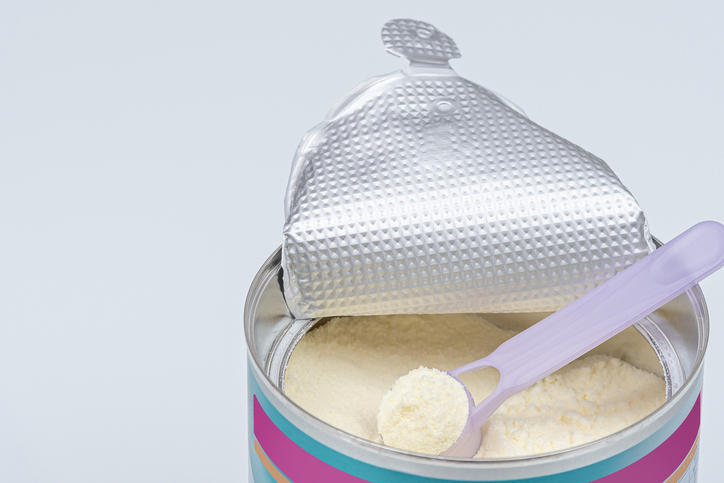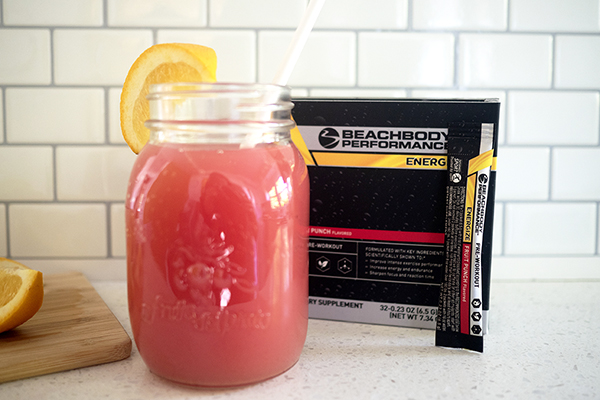“Dry scooping” is a trend made popular by social media influencers in which you consume a dry scoop of pre-workout — straight-up. (You can also dry scoop protein powder, but that’s not as common.) Instead of mixing the powder with water, you put it directly in your mouth and then drink a little water to wash it down. Before you try this at home, know that this trend is downright dangerous.
So even if you’re tempted to give it a try — please don’t. Read on to learn what can happen if you “dry scoop” pre-workout instead of mixing it with water like the instructions recommend.
Why Are People Dry Scooping?

More people than ever are dry scooping because it’s gained popularity on social media.
One study from the American Academy of Pediatrics found that video demonstrations of dry scooping on TikTok have gained more than eight million views. When researchers looked at 100 videos posted under #preworkout on TikTok, they found that only eight percent showed people taking pre-workout as directed by the instructions.
But people who follow the fitness community on Instagram know that dry scooping has been around for a while. Popular “fit-stagrammers” have posted videos of them dry scooping pre-workout before exercising.
How Dangerous Is Dry Scooping?

Trying to dry scoop pre-workout powder carries serious risks. When you take these dietary supplements as a powder instead of mixing them with water, “they can, and likely will, be inhaled directly into the lungs,” warns John R. Windle, MD, a professor of cardiovascular medicine at University of Nebraska.
Unlike certain medications formulated to absorb through the lungs, “powders carry a lot of additional substances that are not absorbed,” Windle explains. These additional substances “can cause dangerous bronchospasm (asthma) and potentially permanent lung damage.”
The “cinnamon challenge,” which saw people on social media attempting to ingest dry spoonfuls of cinnamon, had similar risks.
Windle wants to put that risk into perspective, though. “Like with everything, quantity matters,” he says. He explains that you don’t need to see a doctor if you accidentally inhale some powder as it lingers in the air “unless you start wheezing.”
But if you attempt to take a dry scoop of pre-workout and inhale while doing it, you should call poison control or seek medical attention.
Even if nothing life-threatening happens, coughing on pre-workout is a surefire way to derail any workout and kill your mojo for the day. (It’s also a guaranteed way to end up going viral at the gym for all the wrong reasons!)
Too much caffeine can be dangerous

One of the most significant risks of dry scooping is what Windle calls the “more must be better” mentality. Many people in these videos consumed more than one level scoop of pre-workout. With caffeine, “there is a graded response,” Windle explains. At lower amounts, it can make you feel more focused and energized, but the other side of that spectrum where you’re taking in large doses “ends in toxicity or overdose.”
To put it in more practical terms, the more caffeine you take, the higher your risk of experiencing side effects. And the side effects of caffeine get more severe at higher doses. Mild side effects include jitteriness, facial flushing, muscle twitches, irritability, anxiety, and restlessness. But “excessive caffeine can lead to heart attacks and dangerous heart rhythms,” Windle adds.
But even the mild side effects mean you may have taken too much. Pre-workout should make you feel focused and ready to tackle the workout ahead of you (and sometimes a little tingly from the beta-alanine). If you have too much caffeine, it can detract from your focus during exercise.
There’s also no guarantee with most supplements (more on those exceptions later) that the caffeine content listed on the label is what’s actually inside the supplement. One study on the caffeine content of different pre-workout powders found that the actual amount in each supplement ranged from 59% to 176% of the amount listed on the label.
This discrepancy is especially dangerous for people taking more than one scoop of these supplements, since they can’t know if they purchased a pre-workout with more caffeine than it claims.
Dry scooping has no benefits
Besides being dangerous (and isn’t that enough?), Windle explains that “there is absolutely no benefit to dry scooping.” That’s because the contents of pre-workout are absorbed in solution, whether that’s stomach acids or water. So you’re adding risks to your pre-workout routine without any potential benefit.
What’s the Best Way to Take a Pre-Workout Supplement?

Start by buying pre-workout from a brand you can trust. If you’re sensitive to caffeine, that means you may want to start with half a scoop of pre-workout no matter which brand you try. Building in this trial period gives you some leeway if there’s more caffeine in the pre-workout than the label claims. You can gauge its effects at a half-scoop to see if that’s plenty for your needs.
You may also want to try a new pre-workout for a morning workout not an evening one. No matter what time of day you take it, you should take pre-workout 30 to 45 minutes before starting your workout.
But once you’ve found a brand you can trust — which, ideally, contains the most effective ingredients for pre-workout supplements — and given it a trial period, follow the instructions on how and when to take it. If the label says to mix it with water, do so. You can cut down the amount of water if the liquid is too much to take in before exercise, but you still need to dilute it with water.
If you want to make your pre-workout more portable, Beachbody Performance Energize — which is Informed Sport certified and contains no synthetic colors or artificial sweeteners or flavors — comes in single-serving packets that you can take on the go.
Or you can use it to whip up a batch of homemade pre-workout gummies. They only require 15 minutes of prep time and provide perfectly portioned pieces of energy so you can simply grab a serving and get ready to work.
Above all, no matter which pre-workout you take, always follow the instructions!
The post Before Dry Scooping Pre-Workout, Consider These Risks appeared first on BODi.

0 Comments